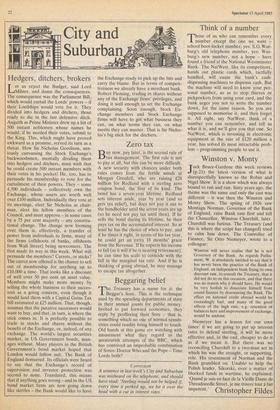City and
Hedgers, ditchers, brokers
Let us reject the Budget, said Lord Milner, and damn the consequences. The consequence was the Parliament Bill, which would curtail the Lords' powers — if their Lordships would vote for it. They divided into hedgers and ditchers, those ready to die in the last defensive ditch. Asquith as Prime Minister drew up a list of 500 instant noblemen whose names he would, if he needed their votes, submit to the King. This, which might have proved awkward as a promise, served its turn as a threat. How Sir Nicholas Goodison, anx- iously canvassing the Stock Exchange's backwoodsmen, mentally dividing them into hedgers and ditchers, must wish that he could create 500 instant members with their votes in his pocket! He, too, has to persuade his membership to Note for the curtailment of their powers. They — some 4,500 individuals — collectively own the Exchange, whose assets are worth well over £100 million. Individually they vote at its meetings, elect Sir Nicholas as chair- man, elect his fellow members of the Council, and must approve — in some cases by a 75 per cent majority — any constitu- tional change. The change now looming over them is, effectively, a transfer of power from individuals to firms, many of the firms (offshoots of banks, offshoots from Wall Street) being newcomers. The first made its way in this week. What will persuade the members? Carrots, or sticks? The carrot now offered is the chance to sell out of membership for anything up to £10,000 a time. That looks like a discount of well over 50 per cent on asset value. Members might make more money by selling the whole business to their succes- sors as a going concern, even though it would land them with a Capital Gains Tax bill estimated at £25 million. That, though, assumes that the putative successors would want to buy, and that, in turn, is where the stick comes in. It is perfectly possible to trade in stocks and shares without the benefit of the Exchange, or, indeed, of any exchange. The world's largest securities market, in US Government bonds, man- ages without. Many players in the British Government's bond market hoped that London would follow suit. The Bank of England demurred. Its officials were heard to say that the Exchange's record of supervision and investor protection was second to none. Translated, this means that if anything goes wrong — and in the US bond market firms are now going down like skittles — the Bank would like to have
the Exchange ready to pick up the bits and carry the blame. But in terms of competi- tiveness we already have a merchant bank, Robert Fleming, trading in shares without any of the Exchange firms' privileges, and doing it well enough to set the Exchange complaining. Soon enough, Stock Ex- change members and Stock Exchange firms will have to get what business they can, on what terms they can, on what merits they can muster. That is Sir Nicho- las's big stick for the ditchers.














































 Previous page
Previous page